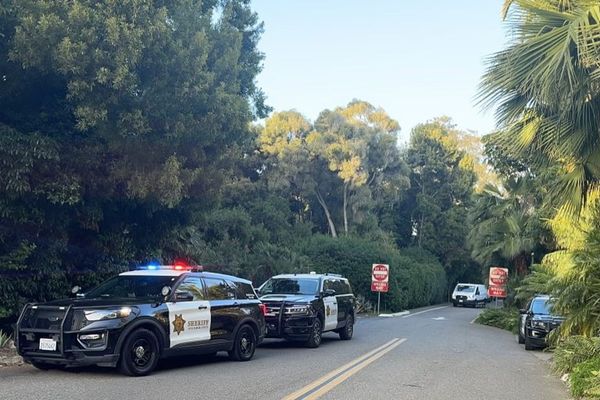
How was it possible to enjoy It’s a Sin, knowing what was to come? Russell T Davies’s great skill was in making it seem like it would be rude not to. It might have been reasonable to expect a certain solemnity from this five-part drama about the arrival of Aids in Britain and the devastation it wrought, but what was less predictable, perhaps, was the furious, beautiful joy of it. It was gut-wrenching and it was terrible, but god, it was funny and it was full of life.
The story corralled a group of young men into the flatshare that would become known as the “Pink Palace”, under the capable watch of house mother-type Jill (Lydia West). At the centre of this ensemble was Ritchie (Years & Years’ Olly Alexander, returning to his former acting career), a bright-eyed dreamer who arrives in London to become an actor; Colin, a sweet-natured walking anorak who eventually swaps his suburban digs for a room in the house; and Roscoe (Omari Douglas), a tart-tongued queen who flames out of a meal with his traditional Nigerian family with inimitable style, eventually finding himself at the heart of the British establishment, in a roundabout sort of way.
Like most of Davies’s shows, from the pioneering Queer As Folk to the Nostradamus-esque Years and Years, it had a defiant bounce to it, a sense of humour that made the darkest moments all the more heart-rending. Ritchie and Roscoe discover a lively gay scene in the city’s pubs and clubs, bringing the party home with them as they learn about sex by having lots of it. (A scene in the first episode, in which Ritchie learns about sexual hygiene, felt quietly revolutionary.) Colin finds a different side of gay life, at first, through his colleague Henry, an older man who lives with his partner in the shadows and tries not to rock the boat.
It is Henry who disappears first, as a mysterious new illness arrives, hitting a now-familiar wall of fear, denial and misinformation. The disappearances keep coming. Friends from the scene “go home” to their families and never return, lost to what relatives might decide to call cancer. In March 2020, the former Conservative MP Ann Widdecombe wrote a column for the Daily Express suggesting that Aids was one of a number of frightening epidemics that had not “proved as devastating as feared”. Though this series finished filming before the current pandemic, it stands as a riposte to such an abhorrent idea. The sheer waste of lives is devastating.
It’s a Sin dealt with complicated ideas, too, which made it a talking point. As the title makes clear, it puts the notions of gay shame and pride up for discussion – that complex concoction of ego and self-loathing – as Ritchie first denies Aids, arguing it is a tool of oppression used by authorities to stop gay men having sex. Eventually the conversation shifts on to his mother, a magnificent Keeley Hawes, who battles it out with Jill until the very end, when both are broken, in different ways. The notion of family looms large here, both given and chosen. The Pink Palace is chosen family, right down to the “La!” that unites them. Roscoe rejects his real family before they can reject him, but later finds reconciliation with his sister. Colin’s mother knows nothing of his life until he is stricken and nonsensical in a hospital bed, in some of the show’s most painful scenes, but she finds solace in his friends, who rally round her. And Ritchie’s family – his disapproving, distant father and hard, brittle mother – are infuriating and cruel, but crucially, also human. They love their son, and the loss of him will destroy them.
It’s a Sin was full of humanity. It had to be. Mistakes are made, because that’s what people do. Ritchie makes big mistakes, from his refusal to get tested and his self-destructive promiscuity, even when he knows what the cost might be, but small ones, too, like his bleak attempt to seduce an old school friend, to make himself feel better. Judgment is mostly absent, reserved for those who most deserve it. It is the institutional mistakes, deliberate refusals to engage with what happened, and not the personal ones, which are the sources of rage.
This was television full of energy and vitality. That’s not to say it failed to take its subject matter seriously enough. It’s a Sin was deeply upsetting, as it was supposed to be, and Davies made us love these characters, flaws and all, before he took them away. I cried at the end of the first episode, knowing what was going to happen, and I wept as it did happen, again and again. The real-world effects of this historical piece came quickly: requests for HIV tests shot up, and a significant amount of money was raised for the Terrence Higgins Trust through sales of a T-shirt bearing the word “La”. Its cast and creator spoke of people whose memories were excavated by the show; young people talked about stories they had not known; activists discussed and argued its finer points. The people who died of Aids were commemorated. Sometimes television is more than just storytelling, even if storytelling is all it strives to do. How was it possible to enjoy it? Because even though we knew some of these men would not survive, Davies made us care deeply about their lives. Even at their most flawed, and most infuriating, we were willing them to live.







